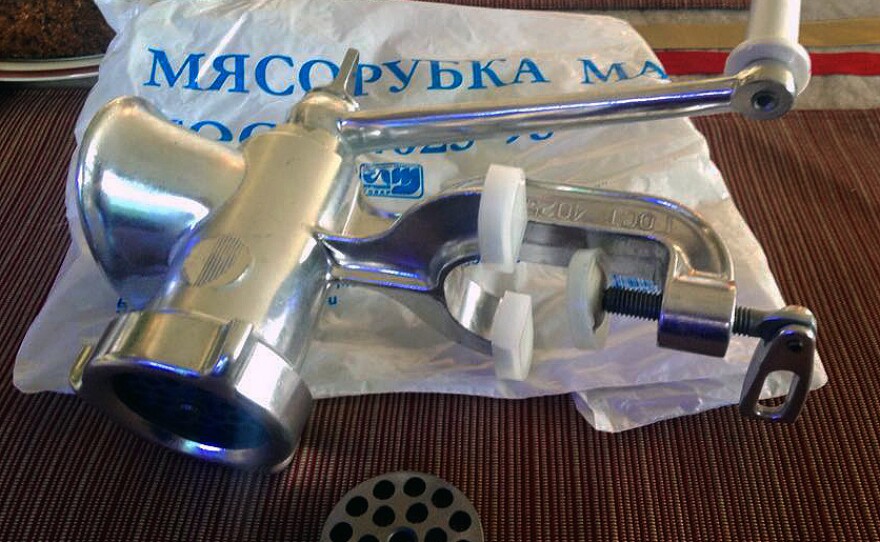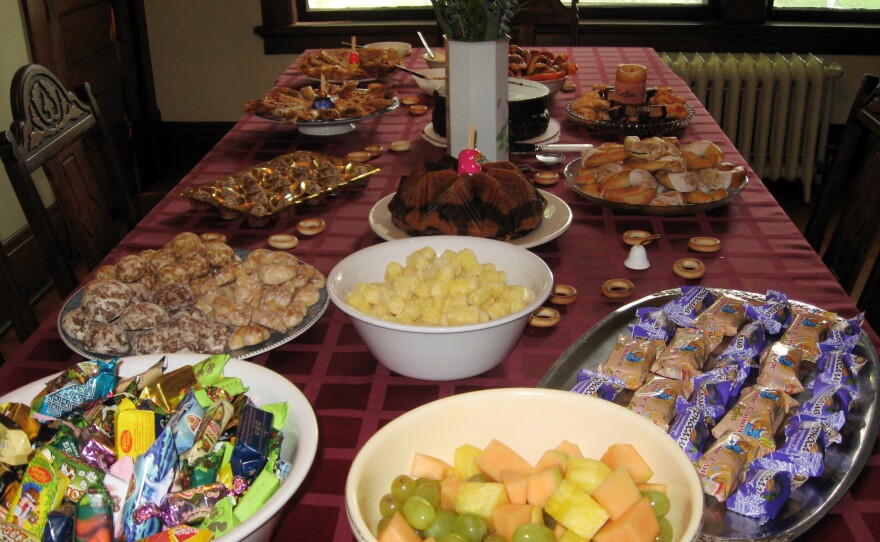

On April 6, 2015, my mother arrived in my one-bedroom apartment after more than 24 hours of air travel and, after a quick nap, declared it was time for presents.
Out of her suitcase emerged an opaque industrial bag dotted with some austere cyrillics. Out of the bag tumbled a small pile of gruesome-looking metal parts. My trained Russian eye instantly summoned their reconstructed visual: My gift was a hand-crank meat grinder. Two-and-a-half pounds of aluminum, in a suitcase, flown overseas.
Months earlier, this particular item had come up when I bragged to my mom about making pelmeni, Russian dumplings. In that conversation, Klavdiya Selyukh discovered that her daughter cooked with pre-ground meat bought at the store. I discovered that such purchases were high on the list of familial sins. The negotiation went thusly:
Mom: "Alina, you need to have a meat grinder."Me: "No, I don't."Mom: "If you don't buy it, I will bring it to you from Russia."
It's the checkmate of long-distance mothering.
More than a decade has now passed since I moved across the world to become a journalist in America. I was a teenager then, bent on shedding my Russianness, eager to stop explaining my backstory to strangers. The tightness of the Selyukh bond has been tested by crappy Skype connections, eye-popping costs of each visit, constant time-zone calculations, the special hell of phone cards and my parents' dial-up.
One glue we can always count on is food.
My mom and her small army of sisters are all indomitably great cooks, steeped in the butter-and-garlic Ukrainian tradition. My dad's Moldovan mother hand-whipped cream and egg whites and produced elaborate baked goods like it was the natural activity between the hours of 6 and 9 in the morning. For my wedding, my sister made not one, but two tiered cakes, forged, like a miracle, in my own kitchen.
(I, too, have tried to carve out a niche in this family food Olympics with accidental bread-baking skills. But my mother — whom I feted on her most recent visit with a burnt yet somehow undercooked steak in a smoke-filled apartment — for some reason refuses to believe me.)
Over the years, the shared culinary experiences have served as moral support, a mental link and a spark for memories.
There was that time my mom almost single-handedly catered my college graduation with two suitcases worth of snacks she hauled from Russia — so nobody starves at "those odd American parties where people eat while standing." Or that time she quietly whipped up and left me with 2 gallons of quick-pickled cabbage — Two. Gallons. Of. Cabbage. — because my husband once mentioned he quite enjoyed it during his visit to Russia. (When I recently asked her what motivated that feat, she said she doesn't remember any such thing.)
There have been years when I didn't have much reason to call home. Work wasn't special, spirits low, news sparse. But food consultation? Always cause to talk.
Mom digs up and dictates a recipe of her sister's pampushki (dinner rolls), though I'm calling at midnight. She guides me through beef cut selection by reviewing photos of meat on WhatsApp. She instructs me, like a gastronomic hotline, in the making of Uzbek plov (rice pilaf), which stews in a Dutch oven that I also acquired from inside her luggage.
Before I left home, my mother insisted on teaching me the intricacies of borsch, the quintessential Russian beet soup I happen to dislike. "No husband of my daughter's will go without borsch," she used to joke far before matrimony was remotely plausible.
Except Klavdiya Selyukh is the funniest person who doesn't joke. When I did get married years later, on the calendar we used as a wedding guest book, my mom inscribed an urgent "Make borsch!" biweekly on every winter-month page.
When we talk about all this now, mom says her motives have been two-fold. One: That's how she was raised herself — a proper woman must learn how to cook. (It was the '60s in the USSR, ok?) Two: "I really didn't want you to forget our culture," she says.
And as time goes by, the same worry grows stronger in me, too. I've started popping by Russian food blogs, judging foreigners' attempts at modernizing my country's cuisine and waging a lonely war against the "t" in borsch. (Trust me on this one.)
Last month, I spent a full Saturday hankering for chebureki (I call them Russian empanadas), to which I finally succumbed in late evening. Making them is a three-step process:
1. Mince pork, beef and onion for the filling.2. Make a basic pastry with flour, egg, oil, salt and water (some chefs recommend a dash of vodka, but I refuse to be a stereotype).3. Put minced meat inside dough pockets and deep-fry your way to bliss.
You might guess where this is going. Too bad the hour was offensively late for my mom to share the sight: Me, kneading the dough in a cloud of flour in one corner of the kitchen. In another — my husband, toiling on that hand-cranked meat grinder that's latched to the top of an ajar dishwasher, because American kitchen counters are not made for this.
Copyright 2016 NPR. To see more, visit http://www.npr.org/.






